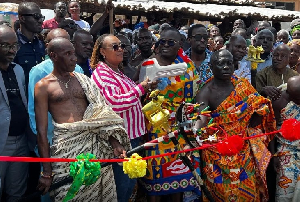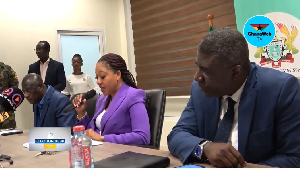The government has banned the use of monofilament nets in fishing.
This announcement was made by the Minister for Fisheries and Aquaculture, Mrs. Mavis Hawa Koomson, who emphasized the government’s commitment to preserving marine resources and ensuring the long-term viability of the fishing industry.
Mrs. Koomson made this announcement during the symbolic closure of the 2024 Closed Fishing Season at Upper Dixcove in the Ahanta West Municipality of the Western Region.
She reiterated that this ban is part of broader efforts to regulate fishing activities, protect marine ecosystems, and secure a prosperous future for coastal communities.
Mrs. Koomson also warned fishermen against landing their fish catch at the Togo border during the closed season. “Be warned that the ministry, together with the Marine Enforcement Unit, will apprehend and charge fishermen who go on with their intention. Moreover, there shall be no more use of monofilament nets and any unauthorized fishing gears after the opening of the season,” she stated.
Mrs. Koomson also highlighted the importance of the health of our oceans, stating, “Let us remember that the health of our oceans is directly linked to the health of our communities. By protecting our marine resources today, we are securing a prosperous future for our offspring. Let us all play our part in ensuring the success of this year’s Closed Fishing Season.”
The minister issued this warning at the symbolic closure of the 2024 Closed Fishing Season at Upper Dixcove in the Ahanta West Municipality of the Western Region. She explained that the annual event is crucial not only for the sustainability of marine resources but also for the long-term livelihood of fishing communities.
“This season has been a period of reflection, rejuvenation, and renewal for our marine ecosystems, and today, we celebrate the positive strides we have made towards sustainable fishing practices. I understand the immense importance of our fishing industry. It is the backbone of many of our coastal communities, providing food, employment, and cultural identity,” she said.
However, Mrs. Koomson noted that catches from both marine and inland sources are rapidly declining, threatening the very existence of the populace due to overfishing and unsustainable practices that have jeopardized marine ecosystems.
“The Closed Fishing Season is an essential measure designed to give our fish stocks the opportunity to replenish. During this period, we are giving our marine resources the chance to recover, ensuring that future generations can continue to benefit from the ocean’s abundance. This initiative is in line with our commitment to sustainable fisheries management and the preservation of biodiversity in our waters,” she said.
In addition to the Closed Fishing Season, the ministry is implementing several other measures to ensure the sustainability of the fisheries sector. These measures include enforcing fishing regulations, promoting responsible fishing practices, and investing in scientific research to better understand marine ecosystems.
“We are also enhancing our collaboration with international partners to combat illegal, unreported, and unregulated (IUU) fishing, which poses a significant threat to our marine resources. I look forward to our continued collaboration in building a sustainable and thriving fishing industry for current and future generations,” she added.
Kwabena Okyere Darko-Mensah, Western Regional Minister, mentioned that fisherfolk constitute about 30 percent of Ghana’s population. He assured that the government values the work of fishermen and fishmongers and is committed to ensuring a good standard of living for them.
Nana Jojo Solomon, President of the Ghana National Canoe Council, praised the minister for ensuring adherence to policies and regulations in the fisheries sector. He advised that marine protected areas should be observed by all fishermen to ensure sustainable fishing in all coastal areas.
Obrepong Hema Dekyi XIV, Chief of Upper Dixcove, praised the Ministry of Fisheries and Aquaculture for hosting the Closed Season in the Ahanta West Municipality. “Involving stakeholders in the industry in your ministry makes the implementation of certain policies easy,” he said. He called on fisherfolk to observe the Closed Season to ensure its success.
Food items such as bags of rice, cartons of cooking oil, boxes of tinned tomatoes, boxes of tinned fish, as well as wire mesh and pans, were distributed to the fisherfolk.
Business News of Monday, 1 July 2024
Source: thebftonline.com

















